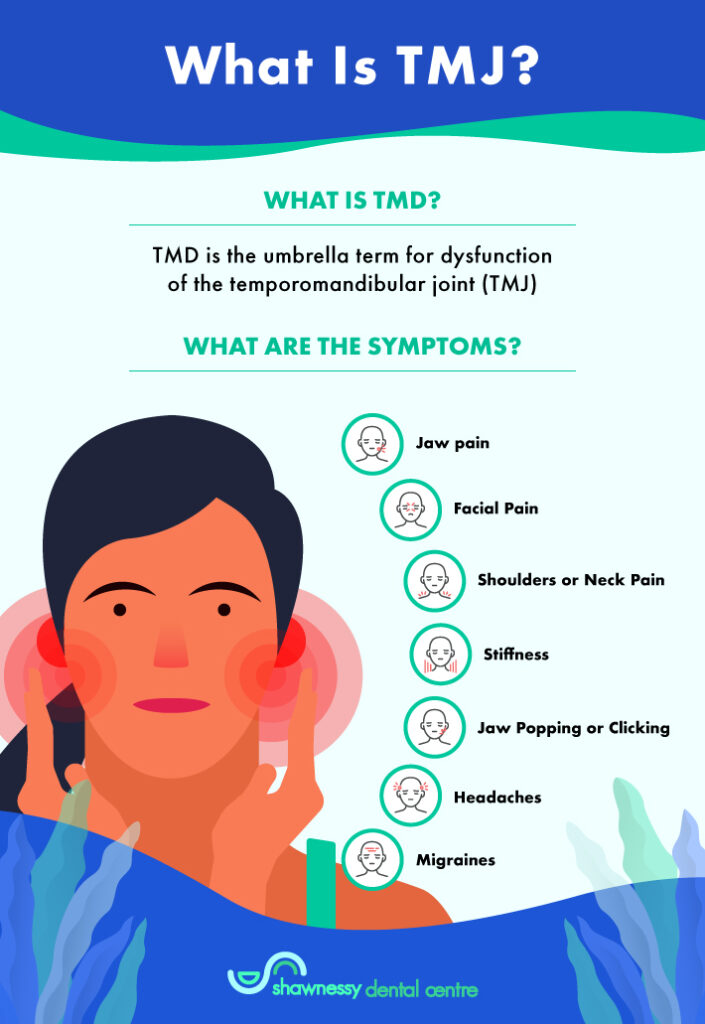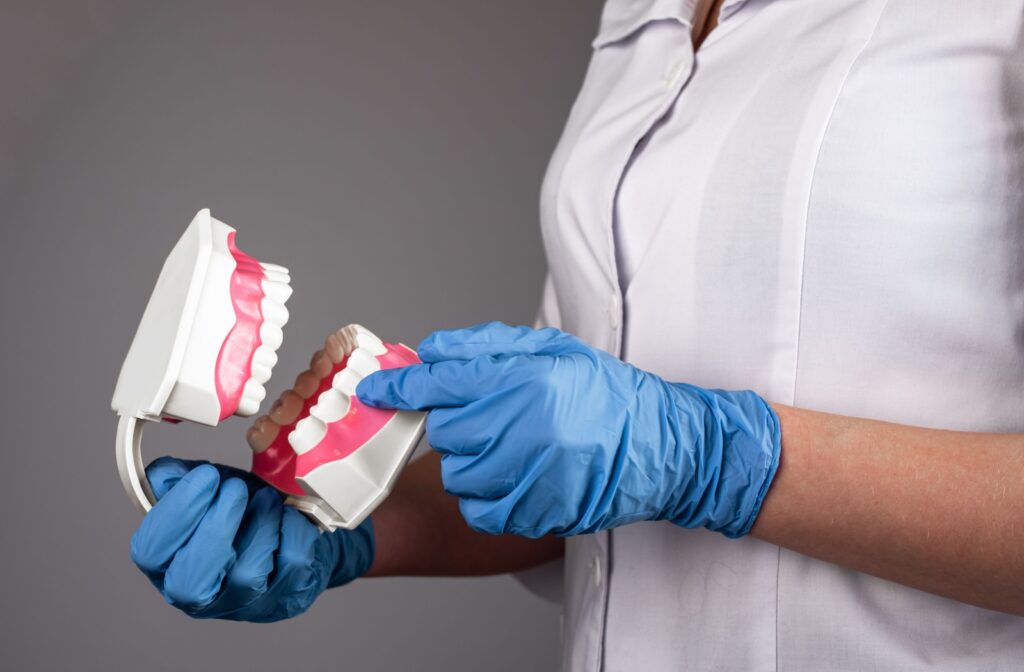Temporomandibular joint disorder, commonly known as TMJ, is a painful and frustrating condition to live with. Common symptoms of TMJ include jaw pain, difficulty chewing, and a clicking or locking jaw. Whether you’re battling constant discomfort or occasional jaw pain, finding a cure may seem daunting.
While there is no singular cure-all treatment for TMJ, a combination of therapies and lifestyle adjustments can help gain some relief from TMJ symptoms.
What Is TMJ?
Your TMJ (temporomandibular joint) connects your jawbone to your skull and allows the movements needed for talking, chewing, and yawning.
When issues arise in this joint or its surrounding muscles, it leads to TMJ disorder, an umbrella term for dysfunction in this area. This condition can manifest as pain in the jaw or face, clicking sounds when you open or close your mouth, or difficulty moving the jaw.
TMJ is not a one-size-fits-all diagnosis. It varies in severity and can present acute discomfort or chronic issues. Knowing what you’re dealing with is the key to finding the right solution.

What Is TMJ Triggered By?
To treat TMJ effectively, it’s essential to identify the root cause. TMJ disorder can result from several factors, such as:
- Teeth grinding (bruxism): Chronic grinding or clenching of your teeth adds pressure to the jaw joint.
- Jaw injury: Trauma to the jaw can lead to TMJ issues.
- Arthritis: Osteoarthritis or rheumatoid arthritis can affect the temporomandibular joint’s function.
- Stress: Stress often results in jaw clenching, which can contribute to TMJ problems over time.
- Misaligned jaw: Poor alignment of your teeth or jaw adds strain to the joint.
- Poor posture: Slouching while sitting or walking can misalign your body and jaw, creating tension in the joint.
Pinpointing your triggers is vital to crafting a targeted treatment plan.
Is It Possible to Cure TMJ?
Yes, for many people, TMJ can be treated, depending on its severity and root cause. Each person’s condition differs, so understanding the underlying issue is critical.
While TMJ disorder cannot be fully cured, certain treatment methods can help relieve some of the symptoms. For instance, TMJ caused by muscle tension or teeth grinding may be reduced with lifestyle changes and targeted interventions. However, in cases involving structural damage, like arthritis or severe misalignment, long-term management may require medical procedures or ongoing treatment.
The key takeaway? Early diagnosis and proactive measures increase your chances of addressing TMJ effectively.

What Is the Most Effective Treatment for TMJ?
There is no singular cure-all treatment for TMJ, but with a combination of therapies and lifestyle adjustments, many patients can find significant and lasting relief.
Oral Appliances (Mouthguards)
Custom-made mouthguards align your bite and help relieve pressure on the jaw. They’re especially beneficial for those who grind their teeth at night.
Physical Therapy
Physio and exercises designed for the jaw can help improve strength and mobility while reducing tension in the muscles surrounding the joint. Stretching and strengthening the jaw can often alleviate TMJ symptoms.
Stress Management Techniques
Chronic stress and anxiety are leading contributors to TMJ. Incorporate stress-reducing techniques like yoga, meditation, or exercise into your routine to help relax the jaw muscles.
Medications
Over-the-counter pain relievers or anti-inflammatory medications can help reduce pain and swelling. More persistent cases may require muscle relaxants or corticosteroid injections prescribed by a professional.
Dental Corrections
If misaligned teeth or an uneven bite are causing your TMJ, corrective dental treatments such as orthodontics or reshaping uneven teeth may be an option.
Surgical Interventions
Although rare, severe cases may require surgical procedures. These could involve repairing damaged joints or realigning the jaw. Surgery is typically considered a last resort after exhausting noninvasive options.
Successful treatment for TMJ often requires a combination of these strategies. Consulting a dentist or healthcare professional can help you choose the methods that best suit your condition.
What If TMJ Gets Worse?
If your TMJ symptoms worsen despite following treatments, it’s crucial to consult a healthcare professional immediately. Persistent or escalating pain could indicate:
- A more complicated structural problem in the joint.
- Progression of arthritis in the TMJ.
- Overuse or damage resulting from untreated grinding or clenching.
Ignoring the symptoms could lead to chronic pain, reduced jaw movement, and sometimes permanent damage. Addressing the issue promptly minimizes the risk of long-term complications.
How to Stop TMJ from Progressing
Preventing TMJ from worsening is just as important as treating it. Here’s how you can proactively protect your jaw health:
- Avoid overuse: Chewing gum, eating hard foods, and clenching your jaw strain the joint. Minimize these actions to give your TMJ relief.
- Maintain good posture: Keeping your spine, neck, and jaw aligned reduces unnecessary tension. Be mindful of your posture while sitting or working long hours.
- Manage stress: Adopt regular stress-busting techniques like deep breathing, mindfulness, or journaling to reduce unconscious clenching.
- Protect against teeth grinding: A custom-fitted mouthguard protects against nighttime teeth grinding that can exacerbate TMJ disorder.
- Stay consistent with treatments: If you’ve been prescribed exercises, devices, or medications, stick to the plan. Consistency promotes better results over time.
- Visit your dentist regularly: Professional monitoring helps track your condition and allows for early intervention if new issues arise.
By being proactive, you can significantly reduce the impact of TMJ on your life.
Take Control of Your TMJ with Shawnessy Dental Centre
TMJ pain doesn’t have to control your life. By understanding its triggers, exploring effective treatments, and prioritizing prevention, you can take significant steps toward relief.
If TMJ is interfering with your daily life, contact our team at Shawnessy Dental Centre in Calgary today. We specialize in helping patients like you find lasting relief through personalized care and innovative treatments. Schedule a consultation now, and take the first step toward a pain-free smile.


